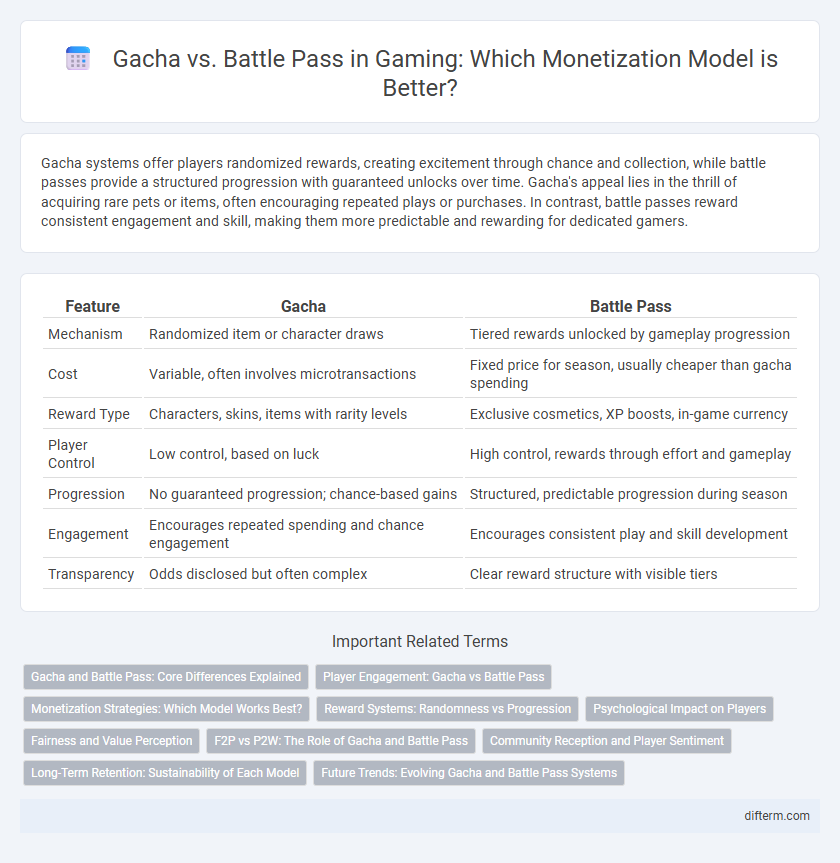Gacha systems offer players randomized rewards, creating excitement through chance and collection, while battle passes provide a structured progression with guaranteed unlocks over time. Gacha's appeal lies in the thrill of acquiring rare pets or items, often encouraging repeated plays or purchases. In contrast, battle passes reward consistent engagement and skill, making them more predictable and rewarding for dedicated gamers.
Table of Comparison
| Feature | Gacha | Battle Pass |
|---|---|---|
| Mechanism | Randomized item or character draws | Tiered rewards unlocked by gameplay progression |
| Cost | Variable, often involves microtransactions | Fixed price for season, usually cheaper than gacha spending |
| Reward Type | Characters, skins, items with rarity levels | Exclusive cosmetics, XP boosts, in-game currency |
| Player Control | Low control, based on luck | High control, rewards through effort and gameplay |
| Progression | No guaranteed progression; chance-based gains | Structured, predictable progression during season |
| Engagement | Encourages repeated spending and chance engagement | Encourages consistent play and skill development |
| Transparency | Odds disclosed but often complex | Clear reward structure with visible tiers |
Gacha and Battle Pass: Core Differences Explained
Gacha systems rely on randomized character or item draws, often requiring players to spend in-game currency or real money for chances to obtain rare rewards, creating a lottery-like experience. Battle Passes provide a structured progression system where players unlock rewards by completing challenges and leveling up during a set season, offering predictable and tiered incentives. The core difference lies in gacha's reliance on chance and monetization tactics versus battle pass's skill and participation-driven reward model.
Player Engagement: Gacha vs Battle Pass
Gacha systems drive player engagement through randomized rewards, creating a sense of anticipation and excitement with each pull, which encourages repeated spending and play sessions. Battle passes offer structured progression and fixed rewards tied to gameplay milestones, fostering consistent daily or weekly engagement as players strive to unlock exclusive content. Both mechanics enhance player retention but cater to different motivations: gacha appeals to chance-driven excitement while battle passes emphasize achievement and steady progression.
Monetization Strategies: Which Model Works Best?
Gacha and battle pass monetization strategies both drive revenue through player engagement, but gacha relies on randomized rewards encouraging microtransactions, while battle passes offer structured progression with guaranteed content unlocking over time. Gacha systems often generate higher short-term income due to the psychological appeal of chance and rare items, whereas battle passes foster consistent revenue and player retention by rewarding regular gameplay. Games employing hybrid models can balance immediate monetization with long-term engagement, making the optimal strategy dependent on target audience preferences and game design.
Reward Systems: Randomness vs Progression
Gacha systems rely on randomness by offering players a chance-based reward mechanism, where items or characters are obtained through luck, often driving repeated spending. Battle pass models emphasize progression, granting players guaranteed rewards as they complete challenges or level up, promoting consistent engagement. The contrast lies in gacha's unpredictability versus battle pass's structured, milestone-oriented rewards, influencing player motivation and spending habits.
Psychological Impact on Players
Gacha mechanics exploit variable reward schedules triggering dopamine release, fostering addictive behaviors and compulsive spending among players. Battle passes offer structured progression and predictable rewards, promoting sustained engagement through goal-oriented motivation and a clear sense of achievement. The psychological impact of gacha systems often leads to impulsive decisions, whereas battle passes encourage consistent play and long-term investment.
Fairness and Value Perception
Gacha systems often rely on chance, which can lead to perceived unfairness due to unpredictable item drops, while battle passes provide transparent progression with guaranteed rewards, enhancing player satisfaction. Battle passes typically offer a clear value proposition by allowing players to unlock exclusive content through consistent gameplay, contrasting with gacha's reliance on microtransactions for randomized outcomes. This transparency in battle passes fosters a stronger sense of fairness and player empowerment compared to the potentially frustrating RNG mechanics of gacha systems.
F2P vs P2W: The Role of Gacha and Battle Pass
Gacha mechanics often lean towards a pay-to-win (P2W) model, as players need to invest significant money to obtain rare characters or items, creating an uneven playing field for free-to-play (F2P) gamers. In contrast, battle passes typically offer a more balanced progression system, allowing F2P players to unlock valuable rewards through skill and time investment without mandatory purchases. The monetization strategies of gacha games favor continuous spending, while battle passes promote sustained engagement and fair competition for all player types.
Community Reception and Player Sentiment
Gacha systems often generate mixed community reception due to their reliance on random chance, leading to frustration among players wary of spending money without guaranteed rewards. Battle pass models tend to receive more positive player sentiment because they offer clear, attainable progression with consistent incentives, fostering a sense of achievement and value. Player feedback frequently highlights that battle passes enhance long-term engagement, while gacha mechanics are criticized for encouraging pay-to-win dynamics and potential exploitation.
Long-Term Retention: Sustainability of Each Model
Gacha systems thrive on randomized rewards, driving short-term engagement but often causing player fatigue over time due to unpredictability and potential spending burnout. Battle passes offer a structured progression with guaranteed rewards, fostering consistent player investment and promoting long-term retention through clear milestones. Data from games like Fortnite and Genshin Impact highlight higher player retention rates and revenue stability tied to battle pass models compared to gacha-centric monetization.
Future Trends: Evolving Gacha and Battle Pass Systems
Gacha mechanics continue to evolve with increased transparency and player-friendly drop rates to address regulatory pressures and enhance user trust. Battle pass systems integrate dynamic content and tiered rewards that encourage long-term engagement and personalized progression paths. Future trends point to hybrid models combining gacha randomness with battle pass structure, offering balanced monetization and sustained player retention.
gacha vs battle pass Infographic

 difterm.com
difterm.com